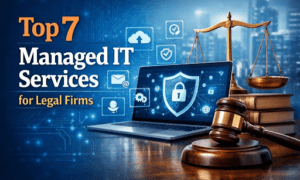The pace of technological innovation is accelerating, reshaping the way businesses operate. Managed IT services, once viewed as a cost-effective alternative to maintaining in-house IT teams, have undergone a profound transformation. In today’s hyper-connected world, managed IT service providers (MSPs) have evolved into strategic partners that drive innovation, ensure resilience, and enable businesses to stay competitive in an ever-changing landscape.
The Shift from Reactive to Proactive Services
In the early days of managed IT services, the focus was largely reactive. MSPs were often called in to fix problems only after they occurred—such as a server crash, software malfunction, or network outage. While these services were valuable, they were largely about damage control. Today, the paradigm has shifted dramatically.
Modern MSPs are adopting proactive approaches, leveraging technologies like artificial intelligence (AI) and machine learning (ML) to predict and prevent IT issues before they arise. Predictive analytics now enable MSPs to monitor networks, hardware, and software systems in real time, identifying vulnerabilities and addressing them preemptively. For instance, if a server is showing early signs of failure, an MSP can replace or repair it before it disrupts operations. This proactive stance minimizes downtime, enhances productivity, and allows businesses to focus on their core objectives.
The Cybersecurity Imperative
As digital transformation permeates every industry, the threat landscape has become increasingly complex. Cyberattacks, ranging from ransomware to phishing scams, are not only growing in frequency but also in sophistication. For businesses, the stakes couldn’t be higher—data breaches can lead to financial losses, reputational damage, and legal repercussions.
MSPs have stepped up as essential allies in the fight against cybercrime. They provide comprehensive cybersecurity services, including advanced threat detection, incident response, and regulatory compliance support. Many MSPs are also adopting zero-trust security models, ensuring that access to systems and data is granted on a strict need-to-know basis. This level of security is especially critical for industries like healthcare, finance, and legal services, where protecting sensitive information is non-negotiable.
Beyond technology, MSPs play a critical role in educating clients about cybersecurity best practices. From conducting employee training sessions to implementing phishing simulations, these efforts build a culture of security awareness that reduces human error—one of the leading causes of data breaches.
Tailoring Solutions for the Hybrid Workforce
The COVID-19 pandemic accelerated the adoption of remote and hybrid work models, creating new challenges for IT management. Employees now work from multiple locations, using various devices, often on networks that aren’t as secure as corporate systems. This has added layers of complexity to IT infrastructure and heightened the need for robust solutions.
MSPs have risen to the occasion by providing services tailored to hybrid work environments. From deploying secure remote access solutions to managing distributed devices, MSPs ensure that employees can work efficiently and securely from anywhere. The implementation of zero-trust architectures and endpoint protection strategies helps mitigate risks associated with remote work. Additionally, MSPs are assisting companies in navigating compliance requirements, particularly for industries with strict data protection laws.
Enabling Innovation Through Cloud Adoption
The cloud has become a cornerstone of modern business operations, offering scalability, flexibility, and cost-efficiency. However, migrating to the cloud and managing cloud environments requires specialized expertise. This is where MSPs shine.
MSPs guide businesses through every stage of cloud adoption, from selecting the right platform to managing workloads and optimizing costs. They also ensure that cloud environments are secure and compliant with relevant regulations. For many businesses, partnering with an MSP makes the difference between a seamless cloud migration and a costly, error-prone transition.
Moreover, MSPs are enabling innovation by helping companies harness the power of emerging cloud-based technologies, such as AI and big data analytics. These tools allow businesses to gain deeper insights, improve decision-making, and develop new products and services.
Building Resilience with Disaster Recovery and Business Continuity
In an interconnected world, disruptions can have far-reaching consequences. Whether caused by natural disasters, cyberattacks, or hardware failures, downtime can be devastating for businesses. According to research, the average cost of IT downtime is $5,600 per minute, emphasizing the importance of robust disaster recovery (DR) and business continuity (BC) strategies.
MSPs are instrumental in helping businesses build resilience. They design and implement DR and BC plans tailored to each organization’s needs, ensuring that critical systems and data are quickly restored in the event of a disruption. Cloud-based backup solutions and redundant systems are commonly employed to minimize downtime and protect against data loss.
The Road Ahead: Partnering for Success
As technology continues to evolve, so too will the role of managed IT services. Trends like edge computing, 5G, and quantum computing are poised to reshape the IT landscape, and businesses will need expert guidance to navigate these changes. MSPs are uniquely positioned to provide this expertise, acting as both advisors and implementers.
Looking ahead, the most successful MSPs will be those that prioritize collaboration and innovation. By forming true partnerships with their clients, MSPs can align their services with business goals, ensuring long-term success. This partnership model not only enhances the value MSPs deliver but also strengthens trust—a critical factor in an era where data and technology are at the heart of every business.
Conclusion
Managed IT services are no longer just about keeping the lights on. They are a driving force behind business innovation, resilience, and growth. In a hyper-connected world, MSPs are transforming from service providers into strategic partners, enabling businesses to thrive in an era of constant change. By staying ahead of technological trends and maintaining a client-first approach, MSPs will continue to shape the future of work and commerce.



































